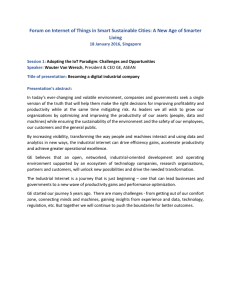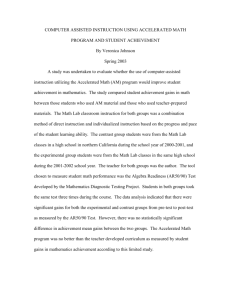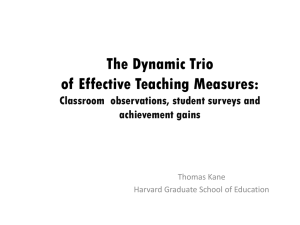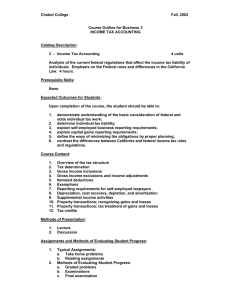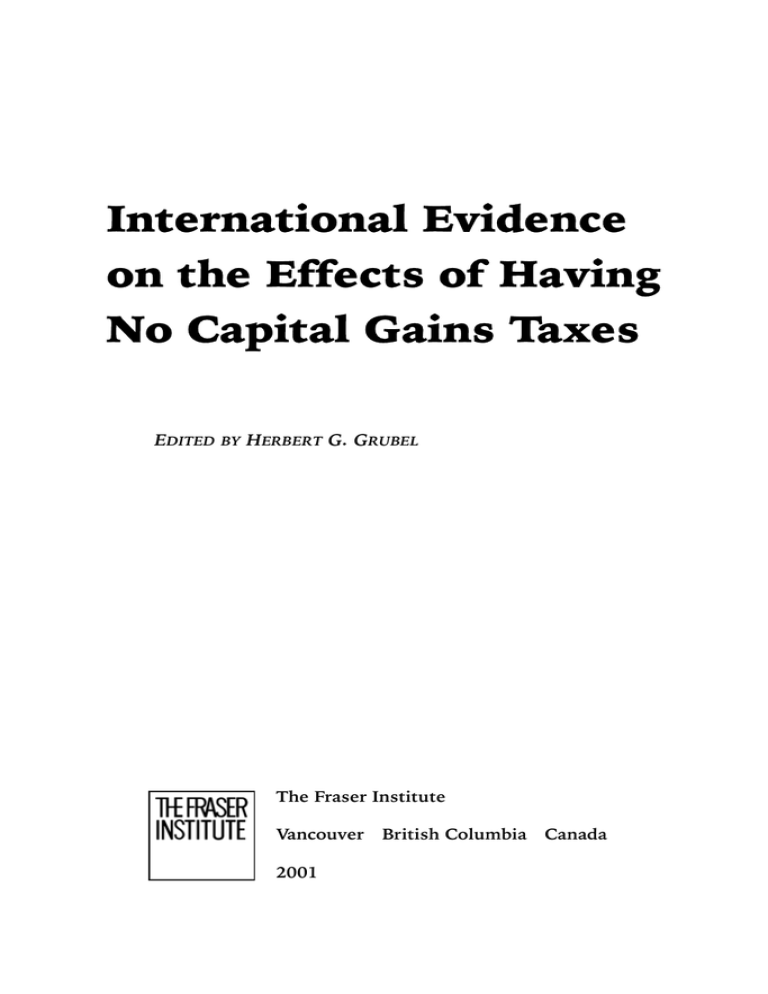
International Evidence
on the Effects of Having
No Capital Gains Taxes
EDITED BY HERBERT G. GRUBEL
The Fraser Institute
Vancouver
2001
British Columbia
Canada
Copyright ©2001 by The Fraser Institute. All rights reserved. No part of this book
may be reproduced in any manner whatsoever without written permission except
in the case of brief passages quoted in critical articles and reviews.
The authors of this book have worked independently and opinions expressed by
them are, therefore, their own, and do not necessarily reflect the opinions of the
members or the trustees of The Fraser Institute.
Printed in Canada.
National Library of Canada Cataloguing in Publication Data
Main entry under title:
International evidence on the effects of zero capital gains taxes
Papers from the Symposium on Capital Gains held Sept. 15, 2000
in Vancouver, BC
Includes bibliographical references.
ISBN 0-88975-189-7
1. Capital gains tax. 2. Capital gains tax--Canada. I. Grubel, Herbert G.,
1934- II. Fraser Institute (Vancouver, B.C.) III. Symposium on Capital
Gains (2000 : Vancouver, B.C.).
HJ4631.I57 2001
336.24'24
C2001-911442-7
Table of contents
About the authors
Preface
vii
/ x
Acknowledgments
1
/
/ xiv
Capital gains taxes in Canada
The case for the elimination of capital
gains taxes in Canada / 3
Herbert G. Grubel
2
Capital gains tax regimes abroad—
countries without capital gains taxes
Tax avoidance due to the zero capital gains tax:
Some indirect evidence from Hong Kong / 39
Berry F.C. Hsu and Chi-Wa Yuen
Capital gains taxation: evidence from Switzerland
Peter Kugler and Carlos Lenz
Capital gains tax: The New Zealand case
Robin Oliver
/
/
73
Capital gains taxation in Mexico and the integration
of corporation and personal taxes / 89
Francisco Gil Diaz
v
55
vi
3
Capital gains tax regimes abroad—
countries with inflation indexing
Capital gains taxation in Britain: The merit
of indexing and tapering / 107
Barry Bracewell-Milnes
Indexation and Australian capital gains taxation
John Freebairn
Capital gains taxation in Ireland
Moore McDowell
/
141
/
123
About the authors
BARRY BRACEWELL-MILNES is an author and consultant on economic and tax policy. He has degrees from Oxford and Cambridge
and was advisor to Erasmus University, Rotterdam (1973–1980)
and to the Institute of Directors, London (1973–1996). He has written 25 books.
FRANCISCO GIL-DÍAZ was CEO and President of Avantel (a joint
venture between Banamex, a Mexican banking group, and WorldCom). Before that, he held numerous, high-ranking executive positions in the public sector. Since early 2001, he has been the
Financial Secretary (Minister of Finance) of Mexico. He holds a B.A.
in Economics from ITAM, the Technological Institute of Mexico and
an M.A. and a Ph.D. from the University of Chicago. He has taught
Economics part-time at various institutions and, between 1970 and
1978, was Chairman of the Economics Department at ITAM. GilDíaz has published extensively on topics such as public finance, exchange-rate policy, macroeconomic management and deregulation
of economic activity.
JOHN FREEBAIRN is a Professor and Head of the Department of Economics, University of Melbourne, Australia. He is a graduate of the
University of New England and the University of California, Davis.
His research interests are taxation reform, unemployment, and the
pricing of infrastructure.
HERBERT GRUBEL is a Senior Fellow and holds the David Somerville Chair at The Fraser Institute. He is a Professor of Economics
(Emeritus) at Simon Fraser University, where he has taught since
1971. He received a B.A. from Rutgers University, and a Ph.D. in
Where a chapter has more than one author, biographical information is given only for the co-author who attended the symposium in Vancouver.
vii
viii
economics from Yale University. He has taught full-time at Stanford
University, the University of Chicago, and the University of Pennsylvania and has had temporary appointments at universities in Berlin, Singapore, Cape Town, Nairobi, Oxford, and Canberra. He was
the elected Reform Party Member of Parliament for Capilano-Howe
Sound from 1993 to 1997 and served as the Finance Critic from
1995 to 1997. He has published 16 books and 180 professional articles in economics dealing with international trade and finance and
a wide range of economic policy issues.
PETER KUGLER has been a Professor of Economics at the University
of Basel in Switzerland since 1997. Formerly, he was professor of
Statistics at the University of Basel (1984–1986), Professor of
Econometrics at the University of Bern (Switzerland, 1987–1993)
and Professor of Economics at the University of Vienna (Austria).
He has published, in refereed journals, over 50 articles on macroeconomics and (international) monetary economics as well as applied econometrics.
MOORE MCDOWELL is a Senior Lecturer in Political Economy at
University College Dublin. He has degrees from University College
Dublin (National University of Ireland at Dublin) and Oxford. He
has been a senior Lecturer in Political Economy at University College Dublin since 1990 and has taught at San Francisco State University (1977/1978) University of California at Davis (1978, 1983,
1984/1985), and the University of Delaware (1988, 1990, 1993).
His areas of teaching and research are industrial organization, public sector, and competition policy. He has written numerous papers,
provided expert testimony in competition law, done advisory work
in mergers, and some industry studies.
ROBIN M. OLIVER has been General Manager, Policy, Inland Revenue
Department, Government of New Zealand since June 1995. In this
position, he is responsible to the Commissioner of Inland Revenue
for the Department’s Policy Advice Division, one of the four business units into which Inland Revenue is divided. The Policy Advice
Division is responsible for providing all aspects of the Department’s
policy advice to the Government. It also includes the international
tax section, which handles the negotiation, administration, and in-
ix
terpretation of New Zealand’s Double Tax Agreements with other
countries. Prior to joining the Inland Revenue Department, Mr Oliver was a taxation partner in the international accounting firm of
Arthur Andersen. A well-known adviser and commentator on taxation matters, Robin is a co-author of a text on the taxation of financial arrangements in New Zealand.
CHI-WA YUEN is an Associate Professor at the School of Economics
and Finance, University of Hong Kong, Hong Kong. He obtained his
Ph.D. in economics from the University of Chicago in 1991. His
doctoral thesis is about the design of dynamic optimal taxation in a
human-capital-based growth environment. He is the author of many
articles in academic journals and a co-author in the latest edition of
a popular graduate text in open economy macroeconomics, Fiscal
Policies and Growth in the World Economy (MIT Press, 1996), originally
written by Jacob Frenkel and Assaf Razin in 1987 and 1992.
Preface
International Evidence on the Effects of Having No Capital Gains Taxes
represents the second part of my ongoing effort to study the costs
and benefits of capital gains taxation in Canada. The first part of
this effort involved a colloquium among 25 economists and entrepreneurs from Canada and the United States who met in June 1999
for the Fraser Institute 1999 Symposium on Capital Gains Taxation.
We discussed the question: “Resolved that Canada’s capital gains
tax rate should be equal to that of the United States.” Drawing on
this discussion, I wrote a monograph entitled Unlocking Canadian
Capital: The Case for Capital Gains Tax Reform (Vancouver, BC: The
Fraser Institute, 2000). The main conclusion of my study was that
the capital gains tax rate in Canada was too high and that lowering
it would increase revenues, have little effect on the distribution of
personal income, and bring large economic benefits.
During 1999 and early 2000, the Senate of Canada held a series of hearings about the merit of the capital gains tax. Unlocking
Canadian Capital included the proceedings of five of these Senate
hearings, all of which supported and expanded on the arguments I
had presented in the first half of the volume. During the same period, the Financial Post published a number of articles by economists,
including myself, who argued the case for lower capital gains tax
rates in Canada.
The Liberal government in Ottawa did not respond officially
to the arguments made in these studies. However, it acted as if it
had been persuaded by them. It lowered the effective rate of capital
gains taxation by about one-third in two distinct steps. The first, announced in the February 2000 Federal Budget, lowered the percentage of realized capital gains that had to be included in personal
income tax returns from 75% to 66.66% for gains realized after February 28. The second was announced in the mini-budget leading up
to the election in November 2000. It reduced the inclusion rate further to 50% for gains realized after October 17, 2000.
x
xi
In effect, these policies reduced the maximum rate of personal capital gains taxation to between 23% and 25% from about 40%
at the highest marginal tax rate on Canadian federal and provincial
taxes combined. As a result, the Canadian rates came close to those
of the United States, though comparisons are complicated. Canada
applies the same rate to all gains regardless of the holding period of
the assets while the United States rates for short-term gains are
higher than those for long-term gains.
The first of the rate reductions was welcomed immediately by
the investment community in Canada. The criticism normally expected from the political left did not materialize. The positive public
reaction to the first cut undoubtedly encouraged the government to
make the further reductions later in the year. It is somewhat surprising that these policies also failed to elicit any negative response
from the political left or the general public.
It is not clear why Canadians were so ready to accept these
lower capital gains tax rates passed in 2000. It is possible that the
cuts were acceptable because they were part of a broader range of
tax reductions made while the fiscal surplus was high and forecast
to grow rapidly. A further cause for the lack of public protest may
have been the fact that the cuts merely reduced the capital gains tax
rates to the level that had prevailed until the 1994 Budget. These
rates presumably had been arrived at after much debate and consultation and had become accepted as a necessary part of a fair and efficient tax system.
In addition, it is almost certain that the barrage of studies of
the harmful effects of capital gains taxation noted above has played
an important role in the government’s decision to lower rates. In my
view, most of the arguments presented in these publications made a
persuasive case not only for lower rates of capital gains taxation but
for the complete elimination of the tax. Almost everyone present at
the symposium agreed that such a policy would increase the rate of
capital formation, foreign investment, and growth in productivity
and, therefore, raise the living standards of all Canadians. However,
these benefits are seen by many to bring some important costs in
terms of lower overall government revenue, requiring higher taxes
on other forms of income. The elimination of the capital gains tax is
also considered to make the income distribution less equal and,
most important, cause strong incentives for tax avoidance.
xii
The question for public policy therefore is: Do the benefits
from the elimination of the tax in terms of higher income outweigh
the costs of lower revenues, greater inequality of income, and incentives for tax avoidance? Unfortunately, the answer to this question
must be based to a large extent on judgements rather than solid empirical evidence, in part because the history of capital gains taxation
in Canada is too short and involves too few changes in rates and
coverage to allow the kinds of econometric studies needed to measure the important changes objectively.
This state of affairs did not prevent the Senate Committee Report to reach the following conclusion, after it had listened to a
number of expert witnesses:
For all of the above reasons, the Committee believes that a
further, substantial reduction in the capital gains tax rate is
warranted. Indeed, as markets for goods and services become
increasingly globalized, and because international competition for capital rests ultimately on after tax rates of return,
Canada cannot ignore developments elsewhere in the world.
Therefore, at a minimum, we recommend that the Canadian
capital gains tax rate should quickly be lowered to match the
rate in the United States. However, this is probably insufficient. A tax rate even lower than the American rate is more
appropriate, as other nations have concluded . . . Thus, the
Committee also recommends that international competitiveness be the criterion guiding the choice of a capital gains tax
regime, and that the federal government be prepared to lower
the tax until that criterion is met. (Senate Banking Committee
Report on Capital Gains Taxation 2000: 22)
Table 1 provides information about the capital gains tax regime of major foreign countries. This information is not easy to obtain and has been compiled by Arthur Andersen through a special
survey and from information from Deloite Touche and KPMG. The
table has been adapted by me by drawing on Appendix A of the Senate Banking Committee Report on Capital Gains Taxation (2000).
This table not only is important in understanding the need for
Canada to consider international competitiveness in setting policy
on capital gains taxation. It also shows that there are a number of
xiii
Table 1: Capital gains tax provisions in selected countries (rates
on individuals, maximum rates on gains from equities)
Short-term
Long-term
Holding
period
Argentina
Exempt
Exempt
No
Australia
24.5
24.5; inflation indexing
No
Belgium
Exempt
Exempt
No
Brazil
15.0
15.0
No
Canada
23–25
23–25
No
Chile
45.0; exclusion $6,600/yr
45.0; exclusion $6,600/yr
No
China
20.0; specific shares
20.0; specific shares
No
Denmark
40.0
40.0; some exemptions
3 years
France
26.0; exclusion $8,315/yr
26.0; exclusion $8,315/yr
No
Germany
55.9
Exempt
6 month
Hong Kong
Exempt
Exempt
No
India
30.0
20.0
1 year
Indonesia
0.1
0.1
No
Ireland
20.0
20.0
No
Italy
12.5
12.5
No
Japan
1.25% of sales price or
20% of net gain
1.25% of sales price or
20% of net gain
No
Korea
20.0; share traded on major
exchange exempt
20.0; share traded on major
exchange exempt
No
Mexico
Exempt
Exempt
No
Netherlands
Exempt
Exempt
No
Poland
Exempt
Exempt
No
Singapore
Exempt
Exempt
No
Sweden
30.0
30.0
No
Taiwan
Exempt
Exempt
No
United Kingdom
40.0; some exemptions
10.0 to 40%; Rate dependent on holding period
Sliding
scale
United States
39.6
20.0
1 year
Source: Adapted from Senate Banking Committee (2000), Appendix A. See source
for more details and source of data.
xiv
countries in the world that have considerable experience in running
a tax system without capital gains taxation. Because this experience
is useful in shedding light on the likely consequences of adopting a
capital gains tax rate of zero in Canada, in September 2000 The
Fraser Institute held the 2000 Symposium on Capital Gains Taxation (September 15, 2000) at which economists from nine countries
addressed a number of issues that I consider important in assessing
the consequences of having no capital gains tax. Some of the papers
discussed countries’ experiences with the use of indexing of capital
gains due to inflation.
Part 1 of the present study presents my views on the merit of
eliminating Canada’s capital gains tax and is based on the existing,
traditional literature. It also summarizes the main findings of the
papers presented at the gathering. Part 2 contains seven papers
written by the participants at the symposium.
Herbert G. Grubel
Acknowledgments
The 2000 Symposium was made possible by the generous support
of the John Dobson Foundation of Montreal. At The Fraser Institute,
Lorena Baran and Adele Waters provided outstanding logistic support for those attending. Kristin McCahon and Lindsey Thomas
Martin were responsible for the production of this conference volume. Joel Emes provided me with excellent notes of the discussions.
Besides the authors of the papers included in this volume, the following participants contributed valuable insights during the symposium: Jason Clemens, The Fraser Institute; Professor Sijbren
Cnossen, Erasmus University; John Dobson, Dobson Foundation,
Montreal; Professor Steve Easton, Simon Fraser University; Professor Jonathan Kesselman, University of British Columbia; Alan Reynolds, The Hudson Institute; Munir Sheikh, Department of Finance,
Ottawa; Professor Ruul van den Dool, Erasmus University; David
Somerville, Calgary; Professor Zane Spindler, Simon Fraser University; Michael Walker, The Fraser Institute; and Professor Thomas
Wilson, University of Toronto.

